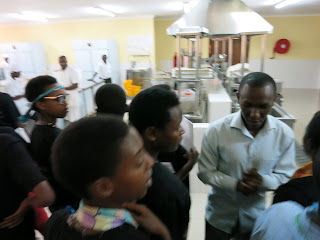 |
| Volunteer Inès and Instructor Blair teaming up to explain parallel connections. |
The other primary aspect of this module was to improve learners' "soft" skills which include leadership, teamwork, communication, and presentation skills. In order for students to directly experience and practice these skills, I designed project roles for each of the students to execute in each mission. Students switched roles for each project to give each student the necessary practice in executing the different roles effectively. I am personally a strong believer in words having the ability to carry an insurmountable amount of power. So I find it very important for children to role play by identifying themselves as leaders, managers or engineers. The project roles for a mission were:
- Project Manager (PM): oversees the tasks, boosts and maintains the team’s moral, and keeps the team on track.
 |
| Students starting on one of their missions for the day! |
- Circuit Designer: responsible for building, and following picture and written instructions exactly.
- Materials Engineer: collects and organizes all pieces needed to complete the current mission.
- Quality Control Engineer (aka Checker): find potential errors with design, and be held accountable for finding and correcting the errors found in the mission.
Since students worked in pairs to complete the "Mission of the Day," each student had to serve as two roles at a time: one student served as the Project Manager/Circuit Designer and the other worked as the Materials Engineer/Quality Control Engineer. We alternated partners each day so that students could experience first-hand working with different personality types. That means that for the duration of the module, a student never worked with the same partner twice.
 |
| Students explaining the "Sound Activated Switch" to Instructor Rodney |
A typical lesson flowed as follows. First, there would be a review activity to gauge what students already knew and/or what they learned during the previous lesson. Then, we gave mini-lectures exposing the students to the big ideas they would form connections with as a result of completing the assigned missions. Students spent the majority of the instruction time building and testing their projects for that day. I also like to keep my classroom fun and engaging so I try to incorporate little "twists" (mini-challenges) in instruction. One of my favorite, as well as the student's favorite was adding to the project the challenge of blindfolding the Circuit Designer/PM while she/he attempts to complete the mission. This experience is symbolic of a leader's vision being clouded and/or obstructed; the team has to find ways to navigate through this challenge to complete the mission. We see this type of phenomena in industry, and especially bureaucracy, so allowing the students to be exposed to this challenge early on in life will hopefully better prepare them in future encounters of the same nature. We would conclude each lesson with discussion of concepts and skills learned, as well as address concepts that may still be unclear or confusing to students.
 |
| Blindfold Challenge |
The primary instructors for the Electronics module were myself (Blair Singleton) and Rodney Singleton II, a MSU PhD Electrical Engineering graduate student. Three Creation Hill volunteers, Ange Inès, Prince Gashongore and Basazababo Honoré, and one teacher, Iragena Pascal, provided vital English-to-Kinyarwandan translations.









